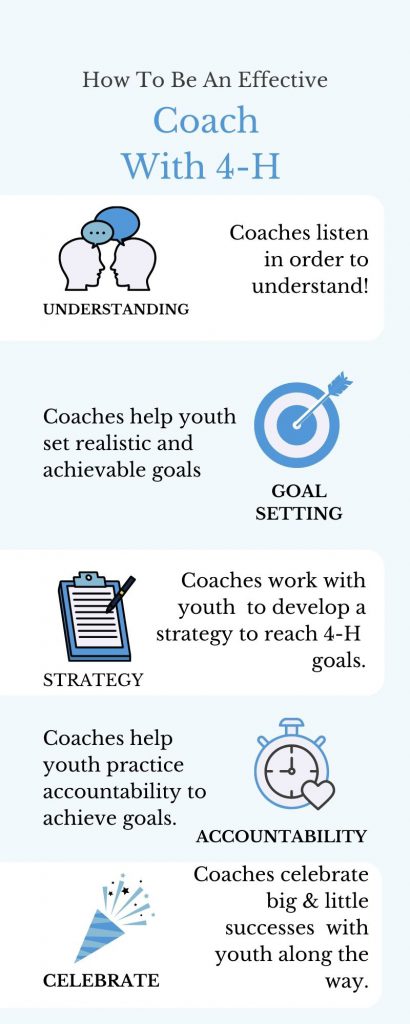What does it mean to be a coach? When you hear the word coach, do you picture someone with a whistle on a sports field? Most of us are probably familiar with sports coaching. However, the concept of coaching has grown to include life and professional coaching as well! This expansion of coaching has established that it is a skill that has applications across a broad array of life situations.
If you google professional coaching, you will find a plethora of books available on the topic. Writer Julie Starr has identified several fundamental coaching skills: building rapport, listening, asking good questions, and giving constructive feedback (Starr, 2021). Those skills sound like the characteristics agents hope to find in a 4-H volunteer!
How Is Coaching Different From Mentoring?
How does coaching differ from mentoring? Zust (2017) contrasted coaching versus mentoring in the business setting, explaining that coaching is a partnership between the coach and the person receiving coaching. The coach helps an individual or team reach or grow toward their potential. Just as a sports coach has a season, a coach in the business setting helps the person or team to reach a goal. How does coaching translate to the 4-H setting? In 4-H, youth may want to complete a project or compete in an event. As a volunteer, you can help coach them through a successful experience! In contrast, Zust (2017) characterizes mentoring as a longer term, developmental process that may not be focused on one particular event or project. In an earlier blog post, I addressed types of mentoring and mentoring practices.
As a volunteer, you may recognize that the 4-H agent you work with has been coaching you! As a 4-H club volunteer, you also have the opportunity to coach the youth enrolled in the 4-H program. In this blog post, you will learn about coaching techniques and how to be a more effective coach to the youth in your clubs. What does it mean to be effective as a coach? In the context of youth development, coaching effectiveness can be defined as the integrated application of “professional, interpersonal, and intrapersonal knowledge to improve youth competence, confidence, connection and character” (Vella et al, 2011).
Getting in the Zone (of Proximal Development)
To better understand how to effectively implement coaching with youth, we will consider the following learning concepts: the Zone of Proximal Development (ZPD) and “scaffolding” (Vinson and Parker, 2019). Vygotsky (1978) defined ZPD as the “distance between actual developmental level as determined by independent problem-solving and the level of potential development as determined through problem-solving under adult guidance or in collaboration with more capable peers.” When I read Vygotsky’s definition of ZPD, I immediately think, “That’s 4-H!” Youth are able to develop and improve skills, ultimately achieving more with the support of caring adults. In 4-H, we also encourage youth to apply what they have learned through teaching others. Several coaching behaviors suggested by Vygotsky include “questioning, demonstrating and introducing the beginnings of task solution” (Vinson and Parker, 2019). These behaviors are ways to use scaffolding as a technique in youth development.
How to Incorporate Scaffolding into Your Coaching Toolkit
Scaffolding is a learning process that can be used as a technique in effective coaching. This technique can help youth build on existing knowledge they have previously acquired. The process works similarly for skill-building and “Scaffolding practices provide the opportunity for children to reach higher-level skills by building on and extending their existing skills” (Mincemoyer, 2016). Three examples of scaffolding strategies that can be used to coach 4-H youth include:
- Modeling and demonstrating: Adult volunteers can demonstrate the skill or ask a youth to demonstrate.
- Incorporating reflection into the club meeting: Build in time for youth to explain to you and their peers what they learned during a club activity.
- Using documentation: Illustrated talks and project books are forms of documentation. Youth may document their learning with photographs, written descriptions, and even video. This documentation becomes a foundation to build on moving forward as more skills are developed.
(Adapted from Mincemoyer, 2016).
In closing, you may already be engaging in effective coaching strategies as a 4-H volunteer without knowing that was what you were doing! If coaching is a new concept for you, this blog post should serve as a starting point for further development in your volunteer experience. Your 4-H agent can be an excellent knowledge resource as well as serving in a coaching role for you.
For more information about positive youth development (PYD) strategies or to learn more about becoming a 4-H volunteer, reach out to your local Extension office.
Resources for Further Reading
Mincemoyer, C. (2016). “Scaffolding Approaches and Practices.” Penn State Extension. Pennsylvania State University. http://bkc-od-media.vmhost.psu.edu/documents/HO_MIL_GI_Scaffolding.pdf
Starr, J. (2021). The Coaching Manual. 5th edition. Pearson Business.
Vella, Stewart & Oades, Lindsay & Crowe, Trevor. (2011). The Role of the Coach in Facilitating Positive Youth Development: Moving from Theory to Practice. Journal of Applied Sport Psychology. 23. 33-48. 10.1080/10413200.2010.511423.
Vinson, D. and Parker, A. (2019) Vygotsky and Sports Coaching: Non-linear practice in youth and adult settings. Curriculum Studies in Health and Physical Education, 10 (1). pp. 91-106. doi:10.1080/25742981.2018.1555003 ORCID: 0000-0001-6842-3067
Vygotsky, L. S. (1978). Mind in Society: The development of higher psychological processes. Harvard: Harvard University Press.
Zust, C. (2017). “Know the Difference Between Coaching and Mentoring.” Kent State University. https://www.kent.edu/yourtrainingpartner/know-difference-between-coaching-and-mentoring
- All About Tabletop Exhibits for the North Florida Fair - September 10, 2024
- Beyond the Blue Ribbon: Make the Most of the 4-H Experience with Your Local Fair - July 5, 2024
- Tips to Help Youth and Families Handle Back-to-School Stress - July 28, 2023


